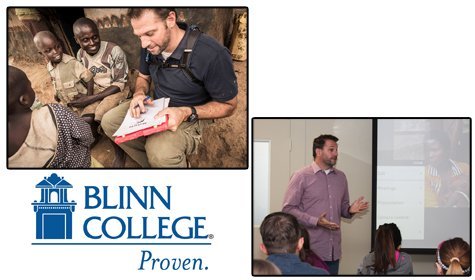Jason Segner fueled his passion of helping people in crisis for a decade as Blinn College’s Emergency Medical Services Program director. Three years ago, that same passion pulled Segner more than 8,000 miles from Bryan to Uganda.
After a short-term mission trip to the East African country in 2010, Segner and his wife Kari were inspired to start Healing Faith Uganda, a nonprofit ministry that provides medical care and education to communities affected by malaria. One of the ways Healing Faith combats the mosquito-borne disease is through Nickels for Nets, a project that provides funding for mosquito nets to be hung in homes.
When Sami Rahman, simulations director and Associate Degree Nursing (ADN) professor, learned Segner would be in Bryan for the first time since uprooting for Uganda three years ago, she asked him to stop by Blinn’s Health Science Center campus to share with the Blinn College Nursing Student Association (BCNSA) how they can further the mission of Healing Faith.
“It’s encouraging when people want to look outside of their bubble to impact others on a larger scale,” Segner said. “Especially since these students are future healthcare workers—they can truly make an impact fighting malaria from all across the world.”
BCNSA students will collect donations for Nickels for Nets throughout the Spring semester. Collection bins will be placed in the Health Science Center campus, located at 8441 State Highway 47. Students are also invited to collect donations individually.
To make a donation, contact Rahman at [email protected] or 979-691-2015.
“For people who want to help people for a living, this is a great experience,” said BCNSA President Josh Gibson, a second-year student from Bryan. “Uganda needs additional medical help and we’re more than happy to do what we can to provide it.”
One mosquito net costs $5 and can protect up to five children from malaria, which causes flu-like symptoms including fever, fatigue, vomiting and headaches. Left untreated, infected individuals may face severe complications, including death. In 2010, an estimated 219 million cases of malaria were reported worldwide and 660,000 people died, according to the Centers for Disease Control and Prevention. More than 90 percent of malaria-related deaths occurred in Africa.
“It doesn’t take a whole lot to make a big impact,” Rahman said. “We know money is hard to come by as a student, but we can start with a little bit and put it all together.”
Blinn’s Division of Health Sciences, based at the Texas A&M Health Science Center, offers associate degree nursing, dental hygiene, emergency medical services, physical therapist assistant, radiologic technology, fire science, therapeutics manufacturing, veterinary technology and vocational nursing programs designed to train students for high-demand professions.

